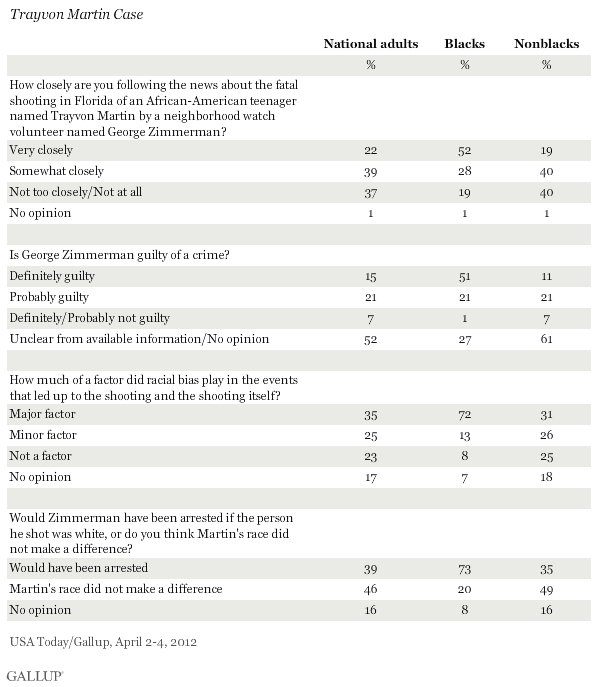PRINCETON, NJ -- Black Americans' views differ dramatically from those of nonblacks regarding the circumstances involved in the death of 17-year-old Trayvon Martin in Sanford, Fla., on Feb. 26. Blacks are paying much closer attention to the news of the incident; overwhelmingly believe that George Zimmerman, the individual who shot Martin, is guilty of a crime; believe that racial bias was a major factor in the events leading up to the shooting; and believe that Zimmerman would already have been arrested had the victim been white, not black.

These results are from an April 2-4 USA Today/Gallup poll of 3,006 Americans, including 242 blacks, conducted as part of Gallup Daily tracking. Martin's death has sparked national interest and, more recently, protests, because Zimmerman, who is white and Hispanic, was not arrested after he claimed self-defense under Florida's "Stand Your Ground" law. With many black leaders and others calling for Zimmerman's arrest and charging racism against the Sanford police department, the case has clearly captured the attention of the large majority of black Americans across the country.
The 52% of blacks who say they are following the news about the Trayvon Martin case very closely contrasts sharply with the 19% of nonblacks who are paying equally close attention. More broadly, eight in 10 blacks are following the story either very or somewhat closely, compared with 59% of nonblacks.
Blacks More Sure That Zimmerman Is Guilty, Racial Bias a Factor
Blacks are much more likely than nonblacks to have an opinion about Zimmerman's guilt. Overall, 72% of blacks say Zimmerman is definitely or probably guilty of a crime; 1% say he is not. Nonblacks also say Zimmerman is guilty, by 32% to 7%, but well over half of nonblacks say Zimmerman's guilt is unclear from the available information.
Blacks are more certain about their opinions than are nonblacks. Blacks who say Zimmerman is guilty of a crime are significantly more likely to say he is definitely guilty than probably guilty, while nonblacks tilt more toward the "probably guilty" choice.
Additionally, 72% of blacks say racial bias was a major factor in the events that led up to the shooting death of Martin, with another 13% saying it was a minor factor. Nonblacks, on the other hand, are significantly less certain, with 31% saying racial bias was a major factor, 26% saying it was a minor factor, and 25% saying it was not a factor at all.
Blacks Say Zimmerman Would Have Been Arrested if Victim Had Been White
A final question included in the poll asked if Zimmerman would have been arrested under the same circumstances if the person he shot was white.
Consistent with the widespread view among blacks that racial bias was a factor in the events surrounding the shooting, blacks overwhelmingly (73%) say Zimmerman would have been arrested had the victim been white. Nonblacks, on the other hand, tilt toward the view that race did not make a difference in the Zimmerman situation (49%), with 35% saying he would have arrested had the victim been white.
Implications
U.S. public opinion about the Trayvon Martin case in Florida reflects the same type of racial divide found in 1995 surveys asking about the murder trial of O.J. Simpson in Los Angeles. In one Gallup poll conducted Oct. 5-7, 1995, for example, 78% of blacks said the jury that found Simpson not guilty of murder made the right decision, while only 42% of whites agreed.
The situation in the Trayvon Martin case is different from the Simpson situation, however, because the victim, rather than the alleged perpetrator, is black. Still, both situations, even though 17 years apart, apparently tap into the same deeply felt views of the average black American that the criminal justice system in America is biased against blacks. Underscoring this conclusion, a 2008 Gallup Minority Rights and Relations survey found that 67% of blacks said the American justice system was biased against blacks, a viewpoint only 32% of non-Hispanic whites agreed with.
Blacks across the country are clearly following and thinking about the Martin case, exemplified by the extraordinary 80% who say they are following the news about it closely. This level of attention to the case comes at a time when a number of prominent black activists and politicians have taken up the case as a cause. MSNBC talk show host Al Sharpton broadcast live from Sanford, Fla., for several days, the Rev. Jesse Jackson and well-known black activists also went to Sanford, black Congressman Bobby Rush of Illinois wore a "hoodie" into Congress to express his concern about the case, and President Obama himself got involved in his responses to questions about the case -- saying if he had a son, he would have looked like Martin.
The average black American has strong views on the case, perceiving that Zimmerman is guilty of a crime and that race has played a major factor in the case. Nonblacks, by contrast, are much less likely to think Zimmerman is guilty and are substantially less likely to believe that race was a factor.
The next steps in the Trayvon Martin case are unclear at this point. Florida's governor has appointed a special prosecutor to look into the case, and a grand jury is slated to review the case on Tuesday. It is possible that Zimmerman will ultimately be arrested and will stand trial. Whatever happens, however, it is clear that the case struck a highly responsive chord with blacks across the country, and that blacks' immediate judgments are that this represents still another example of a racially biased criminal justice system.
Survey Methods
Results for this USA Today/Gallup poll are based on telephone interviews conducted as part of Gallup Daily tracking April 2-4, 2012, with a random sample of 3,006 adults, aged 18 and older, living in all 50 U.S. states and the District of Columbia.
For results based on the total sample of national adults, one can say with 95% confidence that the maximum margin of sampling error is ±2 percentage points.
For results based on the total sample of 242 blacks, one can say with 95% confidence that the maximum margin of sampling error is ±8 percentage points.
For results based on the total sample of 2,764 nonblacks, one can say with 95% confidence that the maximum margin of sampling error is ±2 percentage points.
Interviews are conducted with respondents on landline telephones and cellular phones, with interviews conducted in Spanish for respondents who are primarily Spanish-speaking. Each sample includes a minimum quota of 400 cell phone respondents and 600 landline respondents per 1,000 national adults, with additional minimum quotas among landline respondents by region. Landline telephone numbers are chosen at random among listed telephone numbers. Cell phone numbers are selected using random-digit-dial methods. Landline respondents are chosen at random within each household on the basis of which member had the most recent birthday.
Samples are weighted by gender, age, race, Hispanic ethnicity, education, region, adults in the household, and phone status (cell phone only/landline only/both, cell phone mostly, and having an unlisted landline number). Demographic weighting targets are based on the March 2011 Current Population Survey figures for the aged 18 and older non-institutionalized population living in U.S. telephone households. All reported margins of sampling error include the computed design effects for weighting and sample design.
In addition to sampling error, question wording and practical difficulties in conducting surveys can introduce error or bias into the findings of public opinion polls.
View methodology, full question results, and trend data.
For more details on Gallup's polling methodology, visit www.gallup.com.
